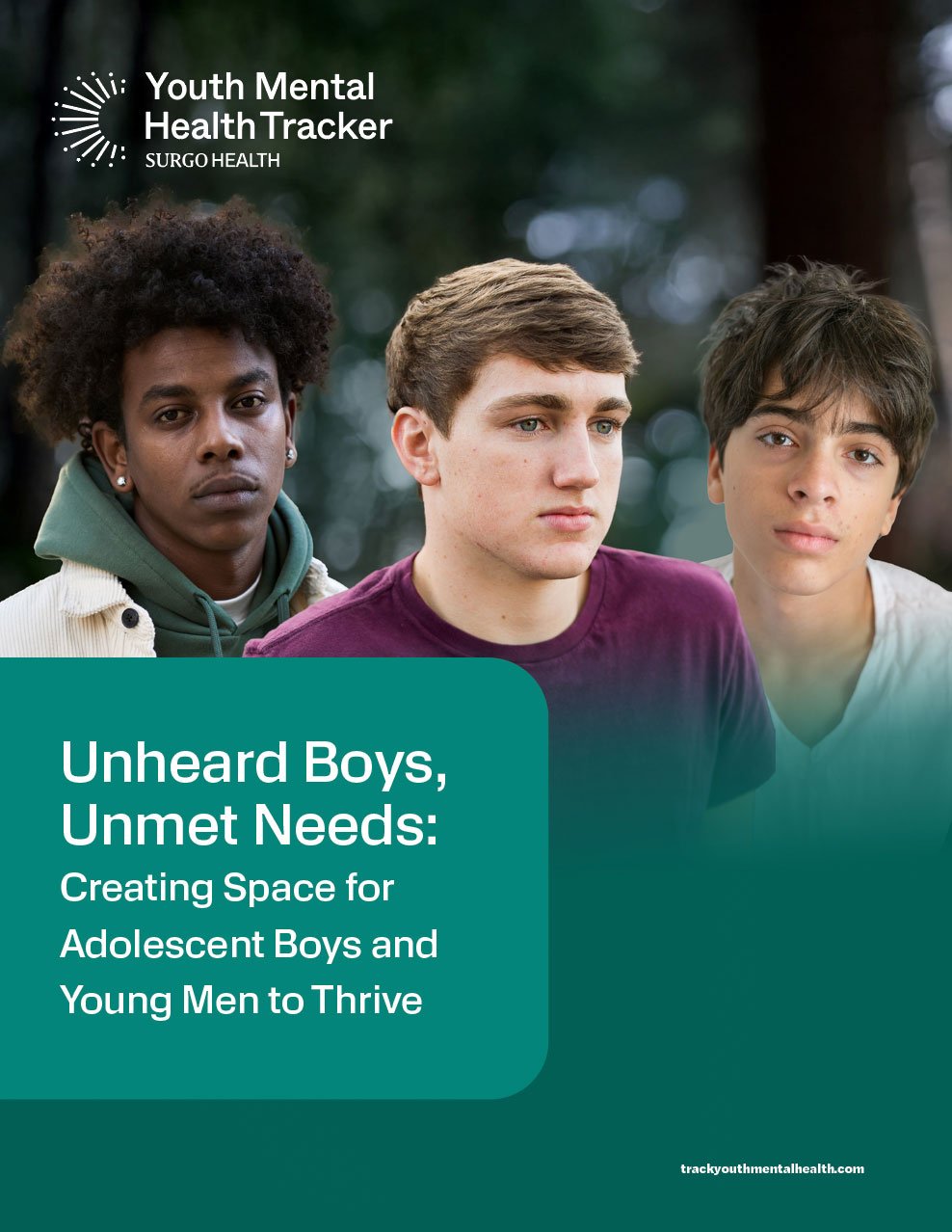Mental Health Support is Failing Boys and Young Men
FOR IMMEDIATE RELEASE
Mental Health Support is Failing Boys and Young Men
New Report from Surgo Health’s Youth Mental Health Tracker Exposes How Support Systems Built Without Boys in Mind Contribute to Declining Community Engagement, Ineffective Digital Tools and Loneliness, Among Other Risks
Washington, D.C. — June 17, 2025 — In a first-of-its-kind analysis, Surgo Health's Youth Mental Health Tracker (YMHT) report pulls back the curtain on a silent crisis: boys and young men in America are navigating mental health challenges without the support systems they need—not because they're unwilling to seek help, but because the help doesn't look, feel, or function like support to them.
The report "Unheard Boys, Unmet Needs: Creating Space for Adolescent Boys and Young Men to Thrive" goes beyond statistics. It tells a human story: how boys experience emotions, why they don't ask for help, and what they say would make a difference.
Surgo Health’s YMHT, which was developed in partnership with Pivotal and SHOWTIME/MTV Entertainment Studios, draws from nationally representative data and the authentic voices of boys ages 15–24, the findings offer a powerful, actionable blueprint for what it would look like to support their mental health.
"We talk a lot about a mental health crisis among youth, but we rarely ask boys what they need or why they're pulling away," said Dr. Sema Sgaier, CEO of Surgo Health. "This report shows us that the issue isn't indifference. It's invisibility. The systems built to support young people weren't built with boys in mind. That's the disconnect we need to fix."
Top Findings:
1. Together, Then Alone: How Group Support Loses Power as Boys Become Men
Group activities help boys feel connected—but only for a while. As they age, the support they once found in community spaces fades.
75% of adolescents (15–17) say group activities help their mental health. Only 62% of young men (18–24) agree.
Participation in religious/faith communities dropped in helpfulness from 64% (15–17) to 48% (18–24), and community volunteering from 68% to 56%, reflecting a broader erosion of communal connection.
2. One Digital Size Does Not Fit All: Customization is Key for Effectiveness
Boys are reaching for help, but the tools they find don't reflect how they live or feel.
74% of adolescent boys and 76% of young men have used social media to learn about mental health or connect with others, only 60% of adolescents and just 43% of young men found it helpful.
The same pattern holds for mental health apps: 50% of adolescents and 54% of young men have tried them, but again, only 60% and 43%, respectively, found them helpful.
3. Racial Realities Shape Risk and Resilience
As boys transition to adulthood, mental health challenges surge.
Hispanic boys lose close emotional outlets: The share with a close confidant drops from 92% in 15-17 year olds to 75% in 18-24 year olds, even as more friends confide in them about mental health (70% to 85%), and feelings of being cared for remain high (99% to 92%).
Black boys face a growing social void: Loneliness among Black boys surges tenfold to 34% by ages 18–24, twice the rate of their White male peers, and experiences of bullying rise sharply. Despite initially being the most likely to find peer conversations helpful (91%), Black boys experience the steepest decline to being the lowest of any group by young adulthood (67%), alongside a lower rate of belonging.
White boys show the largest disengagement from family: The proportion of White boys who feel supported by their family falls from 92% to 66% and the perceived helpfulness of family conversations about mental health falls from 92% to 75%.
The insights in this report present a clear opportunity for leaders in public health, education, philanthropy, technology, and government to reimagine how mental health support is delivered. Culturally responsive, youth-informed, and developmentally aligned solutions are not optional. They are essential.
About Surgo Health
Surgo Health is a Public Benefit Corporation pioneering data and analytics to transform how the healthcare system understands people. We uncover the unseen drivers of health—people’s beliefs, barriers, and behaviors—and transform that intelligence into scalable products that enable organizations to drive impact, reduce costs, and advance equity. By revealing the human side of healthcare, we’re making it more personal, precise, and effective—for everyone.
The Youth Mental Health Tracker (YMHT) created by Surgo Health, with support from Pivotal and SHOWTIME/MTVE Entertainment Studios, uncovers the complexities of youth mental health and wellbeing, providing actionable insights that equip communities, policymakers, and healthcare providers to foster environments where young people can truly thrive.
About SHOWTIME/MTV Entertainment Studios
SHOWTIME/MTV Entertainment Studios produces 120+ series annually, including some of today’s biggest hits such as Yellowstone, Emily in Paris, 1923, 1883, George and Tammy, South Park, Tulsa King, The Daily Show, RuPaul’s Drag Race, The Challenge and Jersey Shore, to name a few, as well as award-winning documentaries through its acclaimed MTV Documentary Films. MTV Entertainment uses its reach for social impact, spearheading broad change-driven coalitions, content and campaigns on mental health and civic engagement.
Media Contact:
Karen Groppe, Interim Director of Communications, media@surgohealth.com

